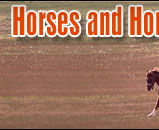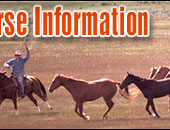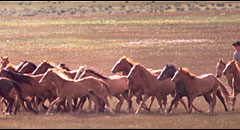 |
   |
|
|
|
You are here: Horses > Horse trainers > Horse Trainers And Problematic Behavior |
Horse Trainers And Problematic Behavior – Part I
By Jeffrey Rolo - Experienced horse owner, trainer and breeder
As a horse owner, former horse trainer and breeder, and the owner of AlphaHorse, I regularly receive a wide assortment of inquiries from new and experienced horse owners alike. The range of questions I receive is far too expansive to include within an article, but one of the more common themes involves horse trainers and problematic equine behavior, so I would like to take a bit of time to share my thoughts about those two topics. |
|
|
When problematic behavior develops within their equine companion(s), many horse owners panic. They want to know how to tackle the problems and whether the assistance of an outside expert is needed. Determining when a horse trainer is actually needed sounds like a good starting point, so let's kick things off there.
Many horsemen will be quick to tell you that a professional horse trainer should be sought out immediately since poor behavior or bad habits, when left unaddressed, become ingrained. There is some truth to this; you definitely do |
not want to turn a blind eye to even the smallest infractions, because otherwise your horse's minor challenges will develop into more serious problems down the road. It's just their nature.
Horses will frequently challenge the authority of their leader in small ways to determine if the leader still holds the upper hand. It's not malicious… it's actually quite practical. Would you want your wellbeing to be placed into the hands of a knock-kneed amateur? Well, horses, being the prey animals they are, aren't fond of the prospect either.
But herein lies the paradox. If a horse's poor behavior (such as bucking or nipping) is meant to challenge your authority, will asking an outsider to address the problem actually help? Well, it's better than nothing, but as a horse's alpha leader technically you should be asserting your authority… not some stranger off the street.
In order for you and your horse to develop a long-lasting bond of mutual respect, there must be no doubt in his mind that you call the shots. Horses will not respect owners that aren't firm, fair and authoritative. When was the last time you observed a weak alpha mare? Good luck finding one - they're about as common as flying pigs.
So in a perfect world we can see that a horse owner would always handle problematic behavior himself, but in the real world that isn't always a practical stance. An inexperienced handler that gets in over his head can compound the problem as well as put his and his horse's health at risk. As such, here is how I would determine whether the assistance of an outside horse trainer is necessary:
Determine the Severity
First it's important to gauge the severity of the problem, and determine whether it's one that you are equipped to confront. Relatively minor behavioral problems such as nipping or refusing to load into a trailer are generally fairly easy to resolve even with minimal experience. Knowledge and patience are the keys to addressing such problems.
Dangerous bad habits such as severe bucking or kicking out at you are obviously another ball of wax entirely. Even an experienced horse trainer would be wary when tackling dangerous behavioral problems such as those, so unless you know how to handle the situation you should defer the remedial corrective actions to an expert. (For example, do you believe a trainer should attempt to "ride out" a bucking horse until the horse understands the rider is the boss? If so, chances are you're not ready to tackle the problem yourself, because that's a haphazard and dangerous act.)
Determine your Mindset
It is absolutely essential that you are confident in yourself and your requests at all times while working around horses. You cannot allow emotion or frustration to enter the mix, because the moment you become impatient, frightened or angry, you've already lost the battle.
If you think you can slap a strained smile over your barely concealed frustration or fear, think again. Horses are far more empathetic than humans, so if you're not cool, calm and collected your horse will know it.

|
Read the next horse trainers article on horse trainers & problematic behavior – part II. |
|
|
|
|
 |
|
|
 |
 |
  
Visit Equestrian Cupid now.
The best and largest equestrian club for meeting the other half for friendship and marriage
|
|
 |
|
|
|
Horse Education
|
|
|
|
|
Horse Information Topics
|
|
|
|
|
|
|
|
Horse Business Owners
|
| |
Advertise with Us
Have your horse products or services exposed to over 27,000 of our monthly visitors.
|
|
|
|
|
|